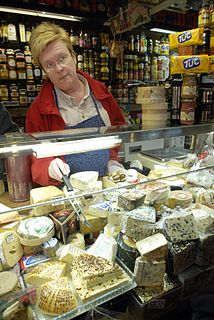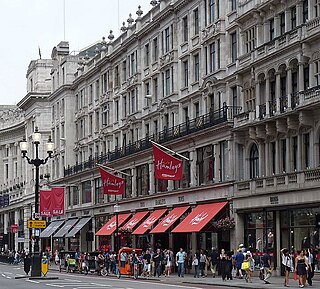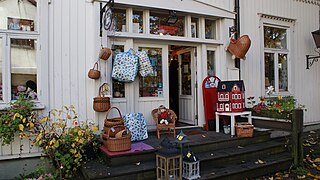
A convenience store, convenience shop, or corner store is a small retail business that stocks a range of everyday items such as coffee, groceries, snack foods, confectionery, soft drinks, tobacco products, over-the-counter drugs, toiletries, newspapers, and magazines. In some jurisdictions, convenience stores are licensed to sell alcohol, although many such jurisdictions limit such beverages to those with relatively low alcoholic content such as beer and wine. Such stores may also offer money order and wire transfer services, along with the use of a fax machine or photocopier for a small per-copy cost. Some also offer to sell tickets or recharge a smart card, like the OPUS card in Montreal. They differ from general stores and village shops in that they are not in a rural location and are used as a convenient supplement to larger stores.

Retail is the process of selling consumer goods or services to customers through multiple channels of distribution to earn a profit. Retailers satisfy demand identified through a supply chain. The term "retailer" is typically applied where a service provider fills the small orders of many individuals, who are end-users, rather than large orders of a small number of wholesale, corporate or government clientele. Shopping generally refers to the act of buying products. Sometimes this is done to obtain final goods, including necessities such as food and clothing; sometimes it takes place as a recreational activity. Recreational shopping often involves window shopping and browsing: it does not always result in a purchase.

Shoplifting is the theft of goods from an open retail establishment, typically by concealing a store item on one's person, in pockets, under clothes, or in a bag, and leaving the store without paying. With clothing, shoplifters may put on items from the store and leave the store wearing the clothes. The terms "shoplifting" and "shoplifter" are not usually defined in law. The crime of shoplifting generally falls under the legal classification of larceny. Shoplifting is distinct from burglary, robbery, or armed robbery. In the retail industry, the word "shrinkage" can be used to refer to merchandise lost by shoplifting, but the word also includes loss by other means, such as waste, uninsured damage to products, and theft by store employees.

A grocery store, grocer or grocery shop (U.K.), is a store primarily engaged in retailing a general range of food products, which may be fresh or packaged. In everyday U.S. usage, however, "grocery store" is a synonym for supermarket, and is not used to refer to other types of stores that sell groceries. In the U.K., shops that sell food are distinguished as grocers or grocery shops, though in everyday use, people usually use either the term "supermarket" or, for a smaller type of store that sells groceries, a "corner shop" or "convenience shop".
Dollarama is a Canadian dollar store retail chain headquartered in Montreal. Since 2009, it is now Canada's largest retailer of items for four dollars or less. Dollarama has over 1000 stores and has a presence in every province of Canada; Ontario has the most stores.

Black Friday is an informal name for the Friday following Thanksgiving Day in the United States, which is celebrated on the fourth Thursday of November. The day after Thanksgiving has been regarded as the beginning of the United States Christmas shopping season since 1952, although the term "Black Friday" did not become widely used until more recent decades.

A chain store or retail chain is a retail outlet in which several locations share a brand, central management, and standardized business practices. They have come to dominate the retail and dining markets, and many service categories, in many parts of the world. A franchise retail establishment is one form of chain store. In 2005, the world's largest retail chain, Walmart, became the world's largest corporation based on gross sales.
Apple Store is a chain of retail stores owned and operated by Apple Inc. The stores sell various Apple products, including Mac personal computers, iPhone smartphones, iPad tablet computers, iPod portable media players, Apple Watch smartwatches, Apple TV digital media players, software, and selected third-party accessories.
Toys "R" Us is an international toy, clothing, and baby product retailer owned by Tru Kids, Inc. and various others. It was founded in April 1948, with its headquarters located in Wayne, New Jersey, in the New York metropolitan area.

A charity shop (UK), thrift shop or thrift store (USA) or opportunity shop (others) is a retail establishment run by a charitable organization to raise money. Charity shops are a type of social enterprise. They sell mainly used goods such as clothing, books, music albums, DVDs, toys and furniture donated by members of the public, and are often staffed by volunteers. Because the items for sale were obtained for free, and business costs are low, the items can be sold at competitive prices. After costs are paid, all remaining income from the sales is used in accord with the organization's stated charitable purpose. Costs include purchase and/or depreciation of fixtures, operating costs and the building lease or mortgage.
Montgomery Ward Inc. is the name of two successive brand-related American retail enterprises. It can refer either to the original Montgomery Ward, a pioneering mail order and department store retailer which operated between 1872 and 2001, and to the current catalog and online retailer also known as Wards.

Hamleys is a British multinational toy retailer, one of the oldest and largest in the world, owned by the Indian company Reliance Retail.

A big-box store is a physically large retail establishment, usually part of a chain of stores. The term sometimes also refers, by extension, to the company that operates the store. The store may sell general dry goods, in which case it is a general merchandise retailer, or may be limited to a particular specialty or may also sell groceries, in which case some countries use the term hypermarket, whereas in the U.S. there is no specific term for the format, which both Target and Walmart offer in most branches.

A toy store or toy shop is a type of retail business specializing in selling toys.
Retail media is marketing to consumers at or near their point of purchase, or point of choice between competing brands or products. Common techniques include in-store advertising, online advertising, sampling, loyalty cards and coupons or vouchers.

Ron Johnson is the former chief executive officer of J. C. Penney. Previously, he was the senior vice president of retail operations at Apple Inc., where he pioneered the concept of the Apple Retail Stores and the Genius Bar, and the vice president of merchandising for Target Corporation, where he was credited for making the store appeal to a younger and trendy crowd." He is currently the head of Enjoy, a startup company and he serves on the Board of Directors for Globality Inc., a start-up company based in Menlo Park, CA.

The Entertainer (Amersham) Ltd. is the UK's largest independent toy retailer, which operates more than 170 stores. The company was founded by the husband and wife team Catherine and Gary Grant in 1981, when Gary purchased a local toy shop in Amersham, Buckinghamshire, England.

Children's World or Detsky Mir is a Russian children's retailer. Founded in June 1957, as of February 2017, the company had 525 stores. It is the largest children's goods retailer in Russia and the CIS, with the retail chain in both Russia and Kazakhstan. Detsky Mir Group also owns the ELC retail chain in Russia. In February 2017, PAO Detsky Mir listed its shares in an initial public offering. Vladimir Chirakhov is the CEO.

The retail apocalypse is the closing of numerous brick-and-mortar retail stores, especially those of large chains worldwide, starting around 2010 and continuing onward. In 2019, retailers in the United States announced 9,302 store closings, a 59% jump from 2018, and the highest number since tracking the data began in 2012. Over 12,000 physical stores have closed due to factors including over-expansion of malls, rising rents, bankruptcies of leveraged buyouts, low quarterly profits outside holiday binge spending, delayed effects of the Great Recession, and changes in spending habits. American consumers have shifted their purchasing habits due to various factors, including experience-spending versus material goods and homes, casual fashion in relaxed dress codes, as well as the rise of e-commerce, mostly in the form of competition from juggernaut companies such as Amazon.com and Walmart. A 2017 Business Insider report dubbed this phenomenon the "Amazon effect," and calculated that Amazon.com was generating greater than 50% of the growth of retail sales.
The retail format influences the consumer's store choice and addresses the consumer's expectations. At its most basic level, a retail format is a simple marketplace, that is; a location where goods and services are exchanged. In some parts of the world, the retail sector is still dominated by small family-run stores, but large retail chains are increasingly dominating the sector, because they can exert considerable buying power and pass on the savings in the form of lower prices. Many of these large retail chains also produce their own private labels which compete alongside manufacturer brands. Considerable consolidation of retail stores has changed the retail landscape, transferring power away from wholesalers and into the hands of the large retail chains.













